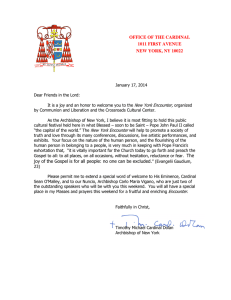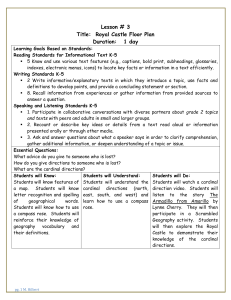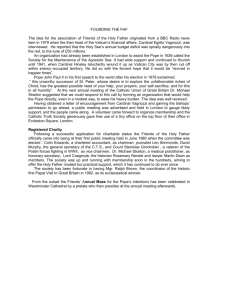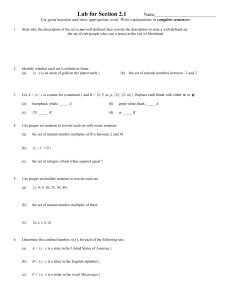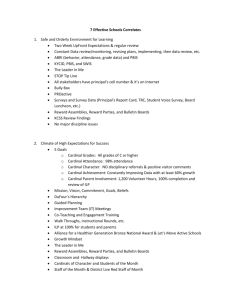In re: MD BSEA #02-3997 - Massachusetts Department of Education
advertisement
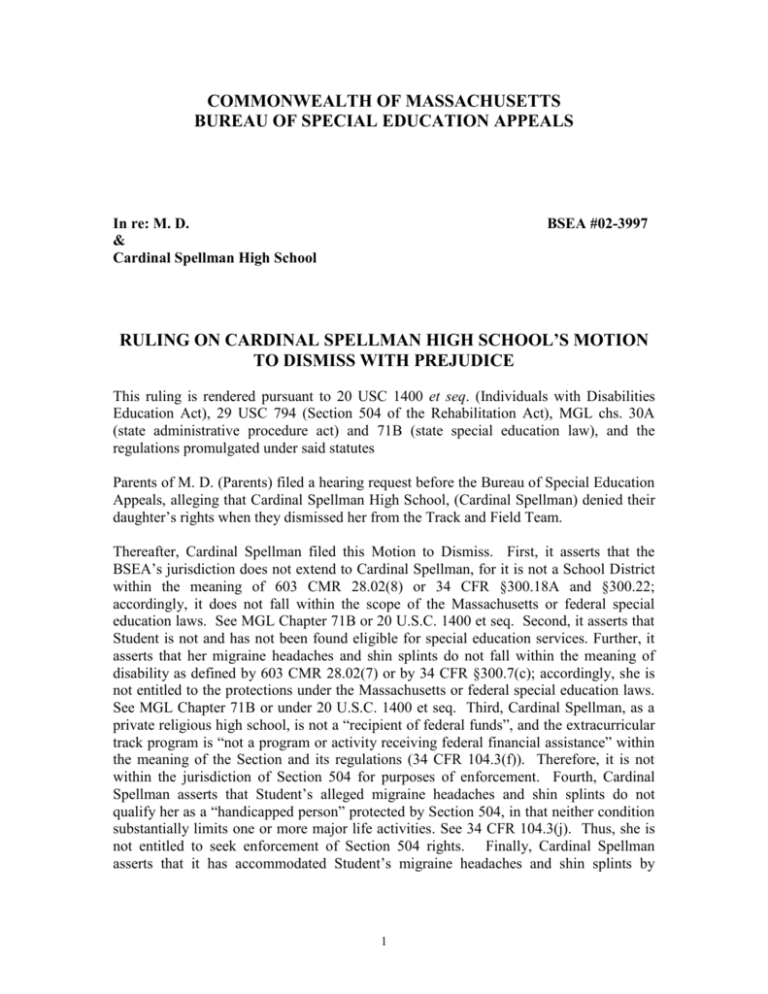
COMMONWEALTH OF MASSACHUSETTS BUREAU OF SPECIAL EDUCATION APPEALS In re: M. D. & Cardinal Spellman High School BSEA #02-3997 RULING ON CARDINAL SPELLMAN HIGH SCHOOL’S MOTION TO DISMISS WITH PREJUDICE This ruling is rendered pursuant to 20 USC 1400 et seq. (Individuals with Disabilities Education Act), 29 USC 794 (Section 504 of the Rehabilitation Act), MGL chs. 30A (state administrative procedure act) and 71B (state special education law), and the regulations promulgated under said statutes Parents of M. D. (Parents) filed a hearing request before the Bureau of Special Education Appeals, alleging that Cardinal Spellman High School, (Cardinal Spellman) denied their daughter’s rights when they dismissed her from the Track and Field Team. Thereafter, Cardinal Spellman filed this Motion to Dismiss. First, it asserts that the BSEA’s jurisdiction does not extend to Cardinal Spellman, for it is not a School District within the meaning of 603 CMR 28.02(8) or 34 CFR §300.18A and §300.22; accordingly, it does not fall within the scope of the Massachusetts or federal special education laws. See MGL Chapter 71B or 20 U.S.C. 1400 et seq. Second, it asserts that Student is not and has not been found eligible for special education services. Further, it asserts that her migraine headaches and shin splints do not fall within the meaning of disability as defined by 603 CMR 28.02(7) or by 34 CFR §300.7(c); accordingly, she is not entitled to the protections under the Massachusetts or federal special education laws. See MGL Chapter 71B or under 20 U.S.C. 1400 et seq. Third, Cardinal Spellman, as a private religious high school, is not a “recipient of federal funds”, and the extracurricular track program is “not a program or activity receiving federal financial assistance” within the meaning of the Section and its regulations (34 CFR 104.3(f)). Therefore, it is not within the jurisdiction of Section 504 for purposes of enforcement. Fourth, Cardinal Spellman asserts that Student’s alleged migraine headaches and shin splints do not qualify her as a “handicapped person” protected by Section 504, in that neither condition substantially limits one or more major life activities. See 34 CFR 104.3(j). Thus, she is not entitled to seek enforcement of Section 504 rights. Finally, Cardinal Spellman asserts that it has accommodated Student’s migraine headaches and shin splints by 1 allowing her to reduce her practice schedule by substituting practice with passive team administrative tasks. Parents object to the dismissal of this case. They assert that Cardinal Spellman failed to reference Student’s psychiatric diagnosis and her treatment plan. They again request the modified practice schedule in order to accommodate her disability. FACTS For purposes of this ruling, the following facts are alleged. Student is an 11 th grader at Cardinal Spellman, a private Catholic high school located in Brockton, Massachusetts. She is not and has never been deemed to be a student in need of special education services. Student was a member of the Track and Field Team, where students are expected to participate in practices daily plus competitions. Student was participating in the practices three times per week plus competitions. Parents allege that Student’s physical and emotional health limit her ability to participate more than the three times per week, and that her physical/emotional health require a more balanced approach via crosstraining with karate. In support of their position, they submitted the following documents. On March 19, 2001, Student’s doctor wrote that Student has a history with migraine headaches, that she knows what she can and cannot do in regards to precipitating migraine headaches, and that the five days of practice can precipitate such headaches. He therefore concurs with Student’s request to decrease the practice times. On April 10, 2001, the Head Athletic Trainer who treated Student for severe shin splints, reported that she must decrease her mileage and get the rest of her cardiovascular workout on a bike or by swimming/running in a pool. Parents stated in their December 10, 2001 letter: “Given her multi-sport commitment, and taking into consideration who she is as an individual, cross training (alternating each sport every other day) suits her the best”. They pointed out that she performed much better and avoided injuries when cross training during the winter months, and developed shin splints during the spring months when she practiced daily. Parents asserted in their January 12, 2002 letter: “There was a time when blacks and women were excluded from mainstream sport. Maybe it is now time for the sports establishment to consider athletes like [M.D.] – they do not lack commitment, but to optimize wellness in their lives, their unique needs deserve consideration.” On January 18, 2002, Student’s physical therapist recommended running on alternate surfaces instead of asphalt, cross training using the pool, karate, and different length runs. On February 13, 2002, Dr. Ross stated her support of Parents’ request in order to help Student to balance priorities in her life. On March 21, 2002, Dr. Cohen requested that Student’s track schedule be modified to allow some balance on her personal, academic and sports life schedules. 2 Cardinal Spellman asserts that it is bound by the Massachusetts Interscholastic Athletic Association’s (MIAA) regulations requiring that team members be “bona fide” in order that its Team can compete with other private schools. Rule number forty-five (45) states that A bona fide member of the school team is a student who is consistently present for, and actively participates in, all high school team practices and competitions. Bona fide members of a school team are precluded from missing a high school practice or competition in order to participate in a non-school athletic activity/event in any sport recognized by the MIAA. Any student who violates this standard is ineligible for the next two contests or two weeks (whichever is greater) immediately upon confirmation of the violation. The students must practice 5 days / week. Any non-compliance with its rules would result in the Team’s ineligibility for interscholastic competitions. Accordingly, at Parents’ request, Cardinal Spellman sought a waiver from MIAA’s Rule #45, requesting that MIAA allow for Student’s desire to cross-train (she participates in karate outside of school), and practice with the Track and Field team only three days / week. Such request was based on a physician’s letter indicating that five days of practice time can precipitate migraine headaches. Such request was denied on October 7, 2002. The MIAA’s Eligibility Review Board ruled unanimously that the extenuating circumstances presented did not warrant a waiver of Rule 45. … They felt it is very important for a student to show loyalty to their team by being present at all practices and games….we believe that [crosstraining] should not detract from participation in interscholastic athletics. The purpose of Rule 45 is to ensure that the school can monitor the balance of academic and athletic pursuits and thus prevent overemphasis on athletics…. We do not believe that the criteria of Rule 84.2 as to hardship have been met, and the waiver request is denied. RULING Although not specifically mentioned, it appears that Parents are seeking protections of Section 504 of the Rehabilitation Act of 1973.1 The applicable law states: services: (a) … A recipient to which this subpart applies shall provide non-academic and extracurricular services and activities in such manner as is necessary to afford handicapped students an equal opportunity for participation in such services and activities. ... (c) Physical .Nonacademic Parents’ request for a hearing fails to assert any rights pursuant to the IDEA or Chapter 766. However, if they had, such claim would be dismissed, for Parents do not assert that Student is in need of special education services. 1 3 education and athletics. … A recipient that offers physical education courses or that operates or sponsors interscholastic, club, or intramural athletics shall provide to qualified handicapped students an equal opportunity for participation. 34 CFR § 104.37 Cardinal Spellman’s MOTION TO DISMISS WITH PREJUDICE is persuasive for several reasons. First and foremost, Cardinal Spellman correctly points out that this Bureau has no jurisdiction over a Section 504 case against Cardinal Spellman. It is true that the BSEA has jurisdiction over Section 504 cases. However, its jurisdiction over Section 504 cases involving this private school is a different question. The relevant subsection of the law states: § 104.39 (a) A recipient that provides private elementary or secondary education may not, on the basis of handicap, exclude a qualified handicapped person if the person can, with minor adjustments, be provided an appropriate education, as defined in §104.33(b)(1), within that recipient's program or activity. … (c) A recipient to whom this section applies that provides special education shall do so in accordance with the provisions of §§ 104.35 and 104.36 [procedural safeguards including an impartial due process proceeding]2. Each recipient to which this section applies is subject to the provisions of §§ 104.34 [educational setting], 104.37, [non-academics] and 104.38 [preschool and adult education]. 34 CFR 104.39 First, Cardinal Spellman states that it is not a recipient of federal funds, within the definition of the law, and absent information to the contrary, it is therefore not subject to Section 504. Parents have provided no evidence that it is a recipient of federal funds. Further, even if it were a recipient, there is no assertion that it provides special education. Absent that, Section 504 does not call for a private school’s subjecting itself to an impartial due process proceeding as is required of public education programs set forth in §104.36. See above §104.39(c). Thus, the law does not support Parents’ assertion that the BSEA’s jurisdiction extends to Cardinal Spellman. Even if this Bureau had jurisdiction over a Section 504 case against Cardinal Spellman, this case would be dismissed for other grounds. That is, Parents make no assertions of a handicapping condition that would render Student eligible for such protection: Student’s physical/emotional difficulties do not fit within the law’s definition of a handicapping 2 § 104.36 Procedural safeguards. A recipient that operates a public elementary or secondary education program or activity shall establish and implement, with respect to actions regarding the identification, evaluation, or educational placement of persons who, because of handicap, need or are believed to need special instruction or related services, a system of procedural safeguards that includes notice, an opportunity for the parents or guardian of the person to examine relevant records, an impartial hearing with opportunity for participation by the person's parents or guardian and representation by counsel, and a review procedure. Compliance with the procedural safeguards of section 615 of the Education of the Handicapped Act is one means of meeting this requirement. 4 condition. A covered handicapped person means “any person who has a physical or mental impairment which substantially limits one or more major life activities. … Major life activities means functions such as caring for one's self, performing manual tasks, walking, seeing, hearing, speaking, breathing, learning, and working.” 34 CFR 300.104.3 Student’s migraine headaches and shin splints, although disabling, are not alleged to substantially limit one of her major life activities; rather, they impede her ability to run on a daily basis and compete as a member on the Track and Field team. This, however, is not a life activity within the meaning of the law3. In Parents’ Opposition to the Motion to Dismiss, Parents allude to a psychiatric diagnosis, however, they assert nothing, again, that would substantially limit one of her major life activities. Thus, Parents failed to assert any claim that would entitle Student to Section 504 protections. For the above-stated reasons, Cardinal Spellman’s MOTION TO DISMISS WITH PREJUDICE is hereby GRANTED. Although ruling in Cardinal Spellman’s favor, it is not without careful thought, for Parents may be justified in their questioning MIAA’s insistence on the 5-day practice rule. Arguably, if Student’s athletic abilities qualify her for the Team even though practicing fewer days than do her Team mates, common sense should support her requested waiver of Rule #45. To compete athletically while still managing migraine headaches is admirable, and if at all possible, should be supported. I note that Cardinal Spellman attempted to do just that by allowing Student to reduce her practice sessions to three times per week while engaging in passive team administrative tasks for the remaining two days per week. It would seem that this accommodation would address Student’s concerns while also addressing MIAA’s concern regarding team allegiance. It may be that although MIAA could not endorse the karate cross-training, it could accept Cardinal Spellman’s allowance of passive team tasks. I also note that MIAA was unclear as to why it ruled that Parents failed to meet the undue hardship criteria, for compliance with a rule that causes migraine headaches would seem to cause an undue hardship. It is unclear why MIAA could not waive Rule #45. By the Hearing Officer, _________________________________ Sandra W. Sherwood Date: December 9, 2002 3 In fact, mere running, not as a competitive sport, is not a life activity within the meaning of the law. “Running, jumping, … simply are not sufficiently significant or essential functions to qualify as major life activity.” See Piascyk v. City of New Haven, (Conn. 1999) 64 F. Supp.2d 19. 5

